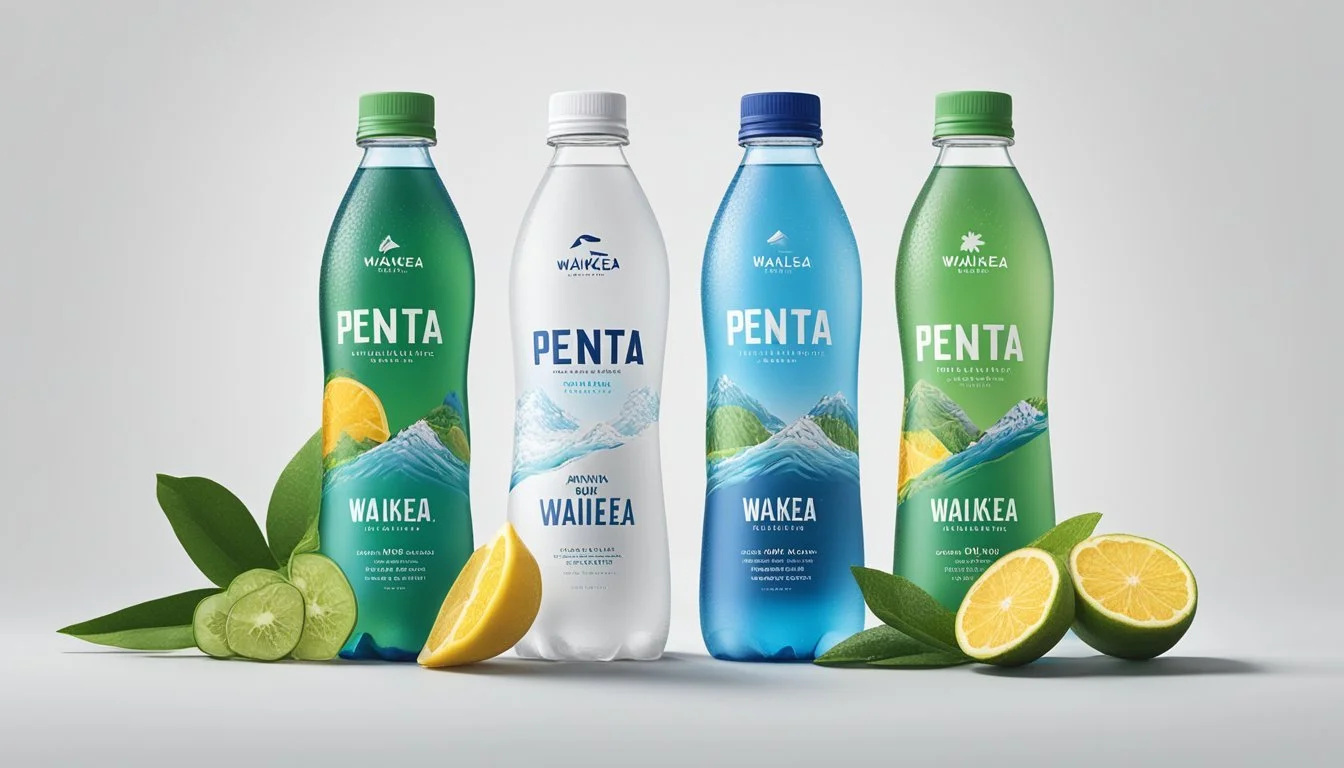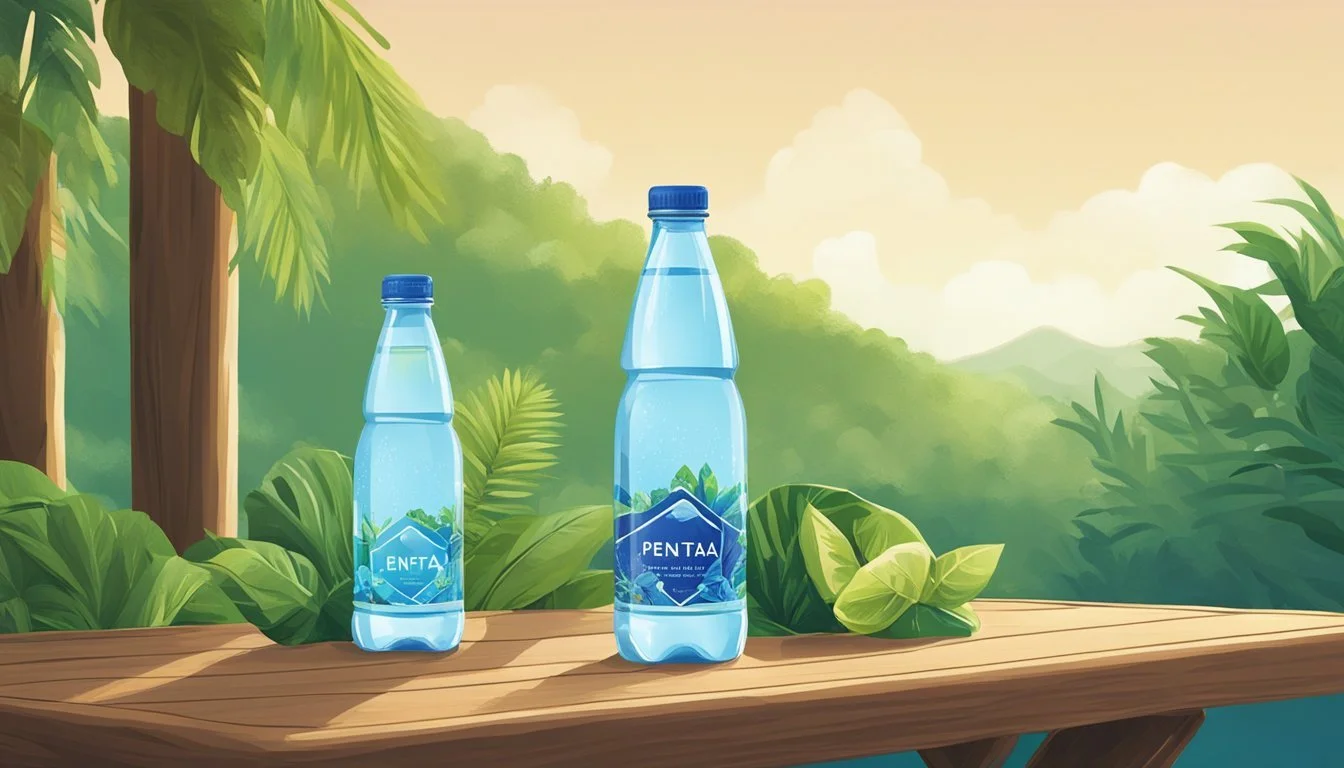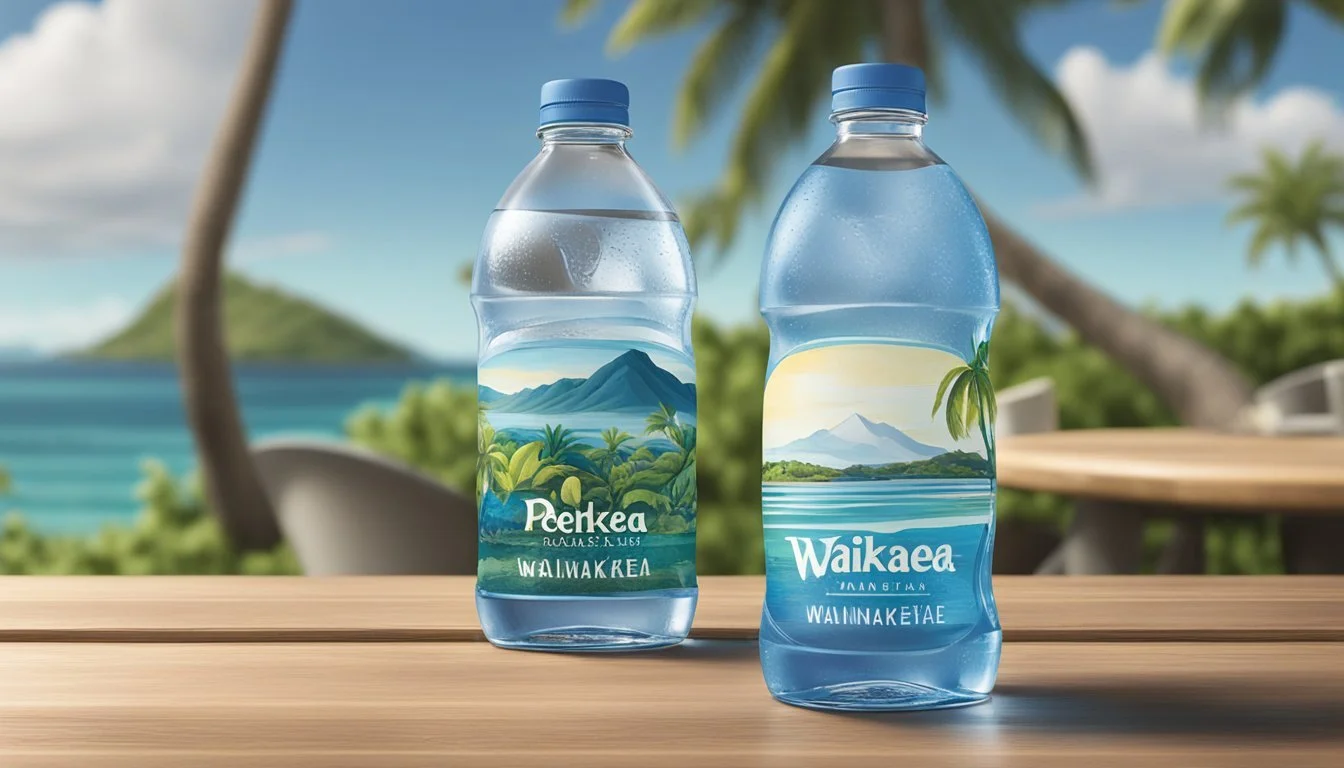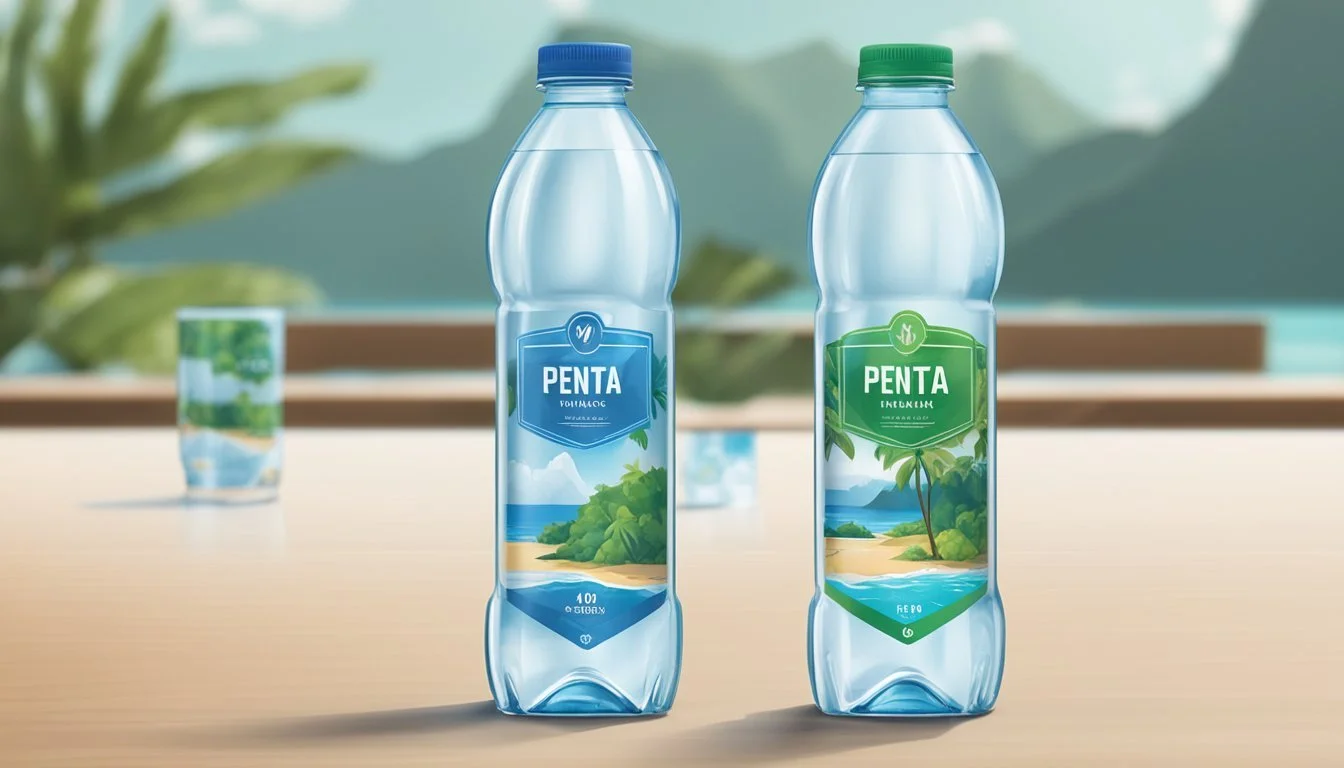Penta vs. Waiakea
A Comprehensive Bottled Water Comparison
In the crowded market of bottled water, two brands frequently stand out for their unique qualities: Penta and Waiakea. Choosing between them involves understanding their distinct characteristics and benefits. When comparing the two, Waiakea often comes out on top for its commitment to sustainability and its unique sourcing from Hawaiian volcanic rock.
Penta water is known for its multi-step purification process that promises ultra-pure water. Its fans appreciate the crisp, clean taste that seems to draw from its stringent processing standards. On the other hand, Waiakea is celebrated not only for its freshness and alkaline properties but also for its environmental initiatives and social responsibility programs.
For anyone serious about making an informed choice, Waiakea's carbon-neutral certification and community contributions might just swing the decision in its favor. The debate between Penta vs. Waiakea ultimately hinges on what matters most to the consumer: purity and taste, or environmental and social impact.
Origin and Source
Understanding the origins and sources of bottled water provides insight into their quality, taste, and purity. Below, we explore the distinct characteristics of Penta and Waiakea waters.
The Source of Penta Water
Penta water is sourced from a deep underground aquifer in the United States. The extraction process ensures the water is shielded from surface contaminants. This natural spring water is known for its high level of purity.
Penta undergoes a unique 13-step purification process that removes impurities at a molecular level. This advanced filtration method results in water containing less than 1 part per billion of impurities. The water is devoid of added minerals, giving it a clean and crisp taste.
Their state-of-the-art purification process is what sets Penta apart. The company takes pride in delivering water that is as close to pure H2O as possible. This meticulous attention to purity makes Penta a preferred choice for those seeking pure and clean drinking water.
The Origin of Waiakea Water
Waiakea water originates from the Mauna Loa volcano in Hawaii. This source contributes to the water’s unique mineral composition and naturally alkaline pH, which ranges from 7.6 to 8.2. The volcanic filtration through porous lava rocks adds beneficial electrolytes and minerals.
Waiakea water is sourced from a pristine volcanic aquifer. The water is bottled directly at the source, ensuring its purity is maintained. The company emphasizes sustainability, operating its bottling facility using 100% renewable energy and packaging the water in recycled materials.
The volcanic origin of Waiakea water significantly influences its distinct taste and health benefits. Its natural spring water quality and eco-friendly practices appeal to health-conscious and environmentally aware consumers.
Purification and Filtration Processes
Penta and Waiakea employ distinct methods to ensure their water's quality and purity. Penta focuses on a multi-step purification process, while Waiakea emphasizes natural filtration through volcanic rock.
Penta Water Purification
Penta Water undergoes an intensive 13-step purification process. This process begins with micron filtration to remove larger particulates. Following this, reverse osmosis eliminates contaminants like fluoride, chlorine, and other harmful chemicals.
The water is then subjected to deionization, which removes ions and further purifies it. Ultraviolet light exposure and ozonation (sterilization methods) ensure any remaining bacteria and microorganisms are eradicated. This process, named Hydro-7, results in ultra-pure water, free of pollutants, achieving exceptional levels of purity.
Waiakea Water Filtration
Waiakea water is known for its natural volcanic filtration. The water is sourced from a volcanic well in Hawaii, allowing it to pass through thousands of feet of porous volcanic rock. This natural filtration process enriches the water with essential minerals and electrolytes, giving it its unique properties.
Ensuring purity and freshness, Waiakea bottles its water directly at the source. The pH level of Waiakea ranges from 7.6 to 8.2, contributing to its naturally alkaline state. This method aligns with sustainability practices, utilizing indigenous resources while maintaining high water quality.
Water Quality and Composition
When comparing Penta and Waiakea bottled water, it's crucial to examine their mineral content and pH levels. These aspects determine the water's health benefits and taste.
Evaluating the Mineral Content
Penta water is known for its ultra-purified composition. It undergoes a unique purification process designed to remove impurities, resulting in water with minimal mineral content. This means Penta has very low levels of common minerals like magnesium, calcium, and potassium.
Waiakea water, sourced from volcanic wells in Hawaii, has a naturally rich mineral profile. It includes electrolytes, calcium, magnesium, and silica. These minerals contribute to the water's unique taste and potential health benefits.
Comparatively, Penta’s absence of minerals offers a purer, cleaner taste, while Waiakea’s mineral content can provide added benefits such as hydration and replenishment of essential nutrients.
Understanding pH Levels and Alkalinity
The pH level of water indicates its acidity or alkalinity. Penta water has a neutral pH of 7, meaning it is neither acidic nor alkaline. This neutrality ensures it’s gentle on the stomach and suitable for all types of diets.
Waiakea water, on the other hand, boasts a pH range of 7.6 to 8.2, making it naturally alkaline. This alkaline nature can help neutralize stomach acid, potentially providing relief for acid reflux symptoms. Moreover, the natural alkalinity is derived from its volcanic source, contributing to its distinct taste and health attributes.
To summarize, Penta offers a neutral option, free from minerals, while Waiakea provides an alkaline alternative with beneficial minerals.
Health and Hydration Benefits
Understanding the health and hydration benefits of Penta and Waiakea bottled water requires examining their hydration efficacy and the health contributions of their minerals and electrolytes.
Hydration Efficacy
Penta water is known for undergoing rigorous purification processes such as micro-filtration and reverse osmosis, achieving 99.9% purity. This high level of purification aids in quick and effective hydration by removing impurities that may affect water absorption.
Waiakea water has a naturally high alkaline pH level of 8.8, which may help neutralize acidity in the body and promote effective hydration. Its volcanic filtration process ensures that the water retains its natural minerals, which can enhance hydration efficacy by supporting bodily functions.
Health Contributions of Minerals and Electrolytes
Waiakea water is rich in naturally occurring minerals like calcium, magnesium, and potassium. These minerals are crucial for supporting various bodily functions, including bone health and muscle function. The addition of electrolytes can also aid in maintaining proper hydration levels, especially after physical activity.
Penta water, while not naturally rich in minerals, is often infused with essential electrolytes to enhance its health benefits. This infusion process can help replenish lost electrolytes, thereby supporting better hydration and overall health.
Both Penta and Waiakea offer unique health benefits, catering to different preferences for purity and mineral content.
Taste Profile and Preferences
Penta and Waiakea are known for their unique taste profiles and mineral compositions. This section will help readers understand the factors that influence these tastes and provide comparisons based on taste tests and consumer preferences.
Factors Influencing Taste
The taste of bottled water is influenced by several key factors. Source and mineral content play significant roles. Penta water undergoes a proprietary filtration process that removes impurities, resulting in a clean, crisp taste.
In contrast, Waiakea is sourced from Hawaii's volcanic wells, giving it a naturally alkaline pH of 7.6 to 8.2 and a unique mineral composition. This contributes to its slightly sweet and refreshing taste.
Packaging can also affect water taste. Some believe that plastic can alter the flavor, making glass or BPA-free bottles preferable for maintaining natural taste profiles.
Taste Test Comparisons
Penta: Consumers often describe Penta as having a pure, almost neutral taste. It has been praised for being exceptionally clean, with no aftertaste. This makes it a favorite for those who prefer a subtle and unobtrusive flavor.
Waiakea: Waiakea’s water taste is often described as refreshing with a hint of sweetness. The natural minerals and electrolytes contribute to a slightly alkaline taste that many find rejuvenating.
In taste tests, Waiakea frequently scores high for its unique and satisfying taste, whereas Penta is lauded for its purity and lack of detectable impurities.
Conclusion: Taste preferences vary among consumers. Some prefer the crisp neutrality of Penta, while others enjoy the unique, slightly sweet taste of Waiakea. Taste tests and consumer reviews can help potential buyers decide which brand aligns with their taste preferences.
Environmental Impact and Sustainability
Penta and Waiākea take markedly different approaches to environmental impact and sustainability, with distinct differences in bottle production and sustainable practices.
Bottle Production and Packaging
Penta uses BPA-free plastic bottles, prioritizing consumer safety. However, their approach doesn't significantly minimize environmental impacts related to plastic waste.
Waiākea, on the other hand, uses 100% post-consumer recycled PET (rPET), which requires 85% less energy to produce compared to virgin plastic. This material choice also reduces water usage by 99% and cuts carbon emissions by 79%.
Brand Material Energy Use Water Use Emissions Penta BPA-free plastic Higher Higher Higher Waiākea 100% rPET 85% less 99% less 79% less
Sustainable Practices and Community Initiatives
Penta focuses on the purity of its water but lacks extensive community or sustainability initiatives. Their efforts are largely limited to ensuring their bottles are safe for consumers.
Waiākea actively promotes sustainability and ethical practices. It was the first U.S. bottled water to be certified Carbon Neutral. Additionally, Waiākea donates over 5% of revenue to nonprofits in Hawaii and globally. Their facility uses 33% renewable energy and the water is sourced from a renewable aquifer with a high recharge rate.
This commitment to community and environmental stewardship sets Waiākea apart in sustainability efforts.
Brand Comparison and Market Position
The bottled water market is highly competitive, featuring numerous brands, each with unique selling points. Penta and Waiakea are two notable players, each targeting specific consumer preferences.
Market Competitors
Penta, known for its ultra-purified water, positions itself against competitors such as Smartwater and Essentia. These brands emphasize purity and advanced filtration techniques.
Waiakea, with its naturally alkaline water, competes with Fiji and Evian. Waiakea's unique volcanic filtration process and sustainability focus set it apart from others.
Nestlé and Coca-Cola are significant players in the broader market, with Pure Life and Dasani, respectively. They rely on mass distribution and branding to maintain their market share, though they don’t specifically compete with Penta's or Waiakea's niche.
Consumer Perception and Brand Trust
Penta’s claim of hyper-purified water appeals to health-conscious consumers wary of contaminants. Its meticulous purification process garners trust among those prioritizing water quality. The brand's minimalist packaging and straightforward marketing enhance its no-nonsense image.
Waiakea enjoys a strong consumer base due to its emphasis on sustainability. The brand's commitment to eco-friendly practices and community initiatives resonates with environmentally-conscious buyers. PepsiCo’s Aquafina and Voss’s premium look also influence consumer choices, but Waiakea’s natural alkalinity and mineral content firmly establish its niche.
Consumers often perceive brands like Evian and Fiji as luxury items, which affects their market dynamics. Penta and Waiakea capitalize on these perceptions by enhancing their unique attributes, thereby solidifying their respective market positions.
Price and Accessibility
Penta is known for its high-quality purification process, which may contribute to its higher price point. A 16.9-ounce bottle typically costs around $2.50. It's generally available in upscale grocery stores and health-focused retailers.
Waiakea, sourced from Hawaii, provides an economical alternative with a 16.9-ounce bottle priced at about $1.50. Additionally, it qualifies for free 2-day Prime shipping for those who order online.
Comparison Table
Brand Price (16.9 oz) Availability Penta $2.50 Upscale grocery stores, online Waiakea $1.50 Broad retail, free Prime shipping
Both brands are recognized for their high-quality water, though Waiakea’s broader accessibility makes it easier to find in various retail settings. Penta’s high-quality purification process adds to its premium feel, but this also limits its accessibility to more niche markets.
More About Penta
Mountain Valley Spring Water vs Penta: Which Bottled Water is Better?
Penta vs Richard's Rainwater: Which Bottled Water is Better?
Penta vs Whole Foods Italian Still Mineral water: Which Bottled Water is Better?
More About Waiakea
Icelandic Glacial vs Waiakea: Which Bottled Water is Better?
Mountain Valley Spring Water vs Waiakea: Which Bottled Water is Better?
Waiakea vs Kirkland Signature: Which Bottled Water is Better?
Waiakea vs Richard's Rainwater: Which Bottled Water is Better?
Waiakea vs Whole Foods Italian Still Mineral water: Which Bottled Water is Better?








